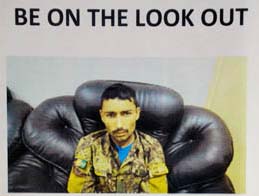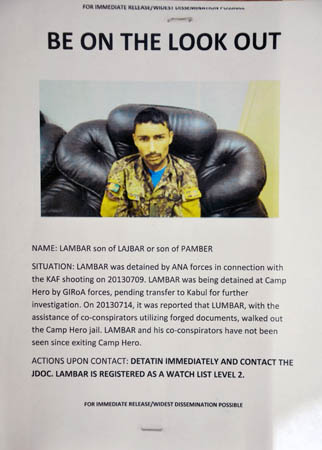
July 16, 2013— security has improved dramatically in Afghanistan since the war’s bloodiest days, hostile acts are still a regular part of life.
security has improved dramatically in Afghanistan since the war’s bloodiest days, hostile acts are still a regular part of life.
Take here, for example, where insurgents launched two rockets in the past several days.
The first attack occurred around 9:40 p.m. local time on Sunday, July 14. The second rocket struck roughly 10 hours later.
Sunday evening, I was sitting in my bunk working on a story for Air Force Magazine when I heard a whoosh followed by a loud bang. Seconds later, a British female voice over the loudspeaker confirmed what I had feared—I had just experienced my first rocket attack.
As instructed upon my arrival, I hit the deck and started counting to 200. Then I grabbed my boots, notebook, pen, and flashlight—which thankfully I had laid out right beside the bed in the event of an attack. A minute or so later, I headed to the bunker—a heavily fortified cave of thick, reinforced concrete.
Rocket attacks here remain sporadic, said my bunker mates. Sometimes, there will be weeks without an attack and then there may be some that happen back-to-back. Thankfully, the insurgents have notoriously bad aim and rarely does anyone get hurt.
Army Maj. Brooks Little, commander of the 102nd Mobile Public Affairs Detachment—one of my bunker mates—said the insurgents can have different objectives. For example, they may carry out an attack in the evening for no other reason than to harass coalition troops, many of whom are preparing to go to sleep around that time.
As the loud speaker came back on declaring that “the situation is ongoing”—an update given roughly every 20 minutes—the other members of the Media Support Center, where I’m based, made themselves comfortable in dusty old office chairs stashed inside the bunker. Some fired up their iPads and passed the time with games of Monopoly. Others cracked open a book while the rest just chatted. Clearly they’d been through this before.
“We’re all concerned. It’s just something we have to deal with here,” said Little. “It’s easy to get relaxed about events like this, but you have to be mindful about it. You can’t get comfortable with where you’re at. You’re in a war zone and hostile acts are routine. It only takes one time.”
About an hour after the siren first sounded, the female voice came back over the loud speaker declaring, “All clear. All clear. All clear.”
The next morning, on July 15, a second rocket attack occurred—a rare occurrence in daylight. The Luxembourg, one of three dining facilities on base, was packed as coalition troops, civilians, and contractors tried to catch the tail end of breakfast. I had just finished my scrambled eggs and bacon when the same trusty British voice came over the loud speaker once again declaring an attack.
Immediately, everyone dropped their forks, set down their trays, and hit the deck. Some troops posed for pictures under the dining tables, others patiently waited for the two minutes to pass before getting up and resuming their breakfast. Since the dining facility is a hardened shelter, a bunker run was not necessary. Twenty minutes later, the “all clear” sounded and the DFAC emptied as everyone went off to start their day.
The back-to-back rocket attacks took place less than a week after an Afghan National Security Forces member opened fire on Slovak troops, killing one and wounding several others. There have been conflicting reports as to whether the incident was a “green-on-blue” attack, where Afghan forces intentionally turn their guns on coalition troops, or a negligent weapon discharge.
Either way, officials have said the Afghan was standing watch in a guard tower on the Afghan side of the base when he shot his 240B machine gun at the Slovaks who were on the coalition side of the base.
Afghan troops secured the scene and took the suspect into custody immediately following the July 9 incident, according to an ISAF release. However, a sign hanging on the famed boardwalk here warned passersby that the suspect, whose name is Lambar, escaped from Camp Hero where the Afghans were holding him pending his transfer to Kabul for further investigation.
“It was reported that Lambar, with the assistance of co-conspirators utilizing forged documents, walked out the Camp Hero jail,” states the wanted sign. “Lambar and his co-conspirators have not been seen since exiting Camp Hero,” it states.
In an emailed response to questions, an ISAF official confirmed that this detainee escaped the detention facility “aided by an Afghan military member in southern Afghanistan.”
The incident, said the ISAF official, remains under investigation by AFNS and ISAF forces.
Immediately following the attack, the Air Force suspended all advise-and-assist missions with the Afghans for at least a week, as Air Force officials continue to assess the situation and the base has increased its force protection posture, said Capt. Brian Maguire, a spokesman with the 451st Air Expeditionary Wing here.
“We do what we can to make sure our people our safe,” he said.
Curbing the green-on-blue attacks has become a top priority for coalition forces. Although the number of insider attacks has dropped significantly, Maguire said it’s “always a concern because you never know what someone is going to decide to do.”
There were 48 green-on-blue attacks in 2012, said the ISAF official. However, there have been just six confirmed insider attacks since January 2013. Nine ISAF personnel were killed in those attacks and 28 wounded. By comparison, during the same time last year, there were 20 confirmed insider attacks resulting in 27 ISAF deaths and 57 wounded, according to ISAF figures.
Maj. Rich Zeigler, commander of the 451st Expeditionary Security Forces Squadron here, said despite the recent attacks, the security situation is actually “stronger than I figured it might be coming in.”
Zeigler’s unit has a diverse mission; its members are tasked with protecting US assets on base, which requires regular trips outside the wire, including both ground patrols with Afghan partners and escorts of US aircraft.
Although the frequency of trips outside the wire has temporarily come down, that has more to do with Ramadan than the July 9 attack, said Zeigler.
Some members of the 451st ESFS also served as a quick reaction force during the July 9 incident, he noted. Although he couldn’t offer many details on the incident, he attributed the overall decline in insider attacks to the “awareness of our folks.”
He added, “We are able to pick up on things that just don’t feel right and stop something or intervene before that point.”
